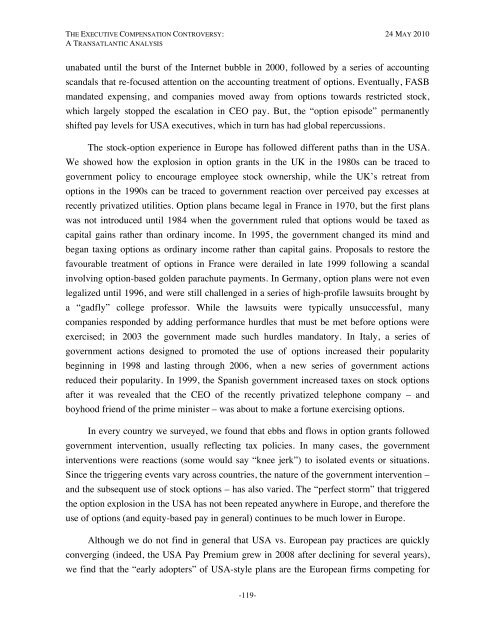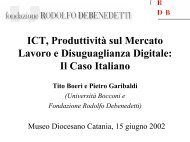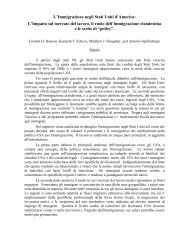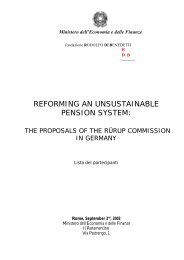The Executive Compensation Controversy - Fondazione Rodolfo ...
The Executive Compensation Controversy - Fondazione Rodolfo ...
The Executive Compensation Controversy - Fondazione Rodolfo ...
Create successful ePaper yourself
Turn your PDF publications into a flip-book with our unique Google optimized e-Paper software.
THE EXECUTIVE COMPENSATION CONTROVERSY: 24 MAY 2010A TRANSATLANTIC ANALYSISunabated until the burst of the Internet bubble in 2000, followed by a series of accountingscandals that re-focused attention on the accounting treatment of options. Eventually, FASBmandated expensing, and companies moved away from options towards restricted stock,which largely stopped the escalation in CEO pay. But, the “option episode” permanentlyshifted pay levels for USA executives, which in turn has had global repercussions.<strong>The</strong> stock-option experience in Europe has followed different paths than in the USA.We showed how the explosion in option grants in the UK in the 1980s can be traced togovernment policy to encourage employee stock ownership, while the UK’s retreat fromoptions in the 1990s can be traced to government reaction over perceived pay excesses atrecently privatized utilities. Option plans became legal in France in 1970, but the first planswas not introduced until 1984 when the government ruled that options would be taxed ascapital gains rather than ordinary income. In 1995, the government changed its mind andbegan taxing options as ordinary income rather than capital gains. Proposals to restore thefavourable treatment of options in France were derailed in late 1999 following a scandalinvolving option-based golden parachute payments. In Germany, option plans were not evenlegalized until 1996, and were still challenged in a series of high-profile lawsuits brought bya “gadfly” college professor. While the lawsuits were typically unsuccessful, manycompanies responded by adding performance hurdles that must be met before options wereexercised; in 2003 the government made such hurdles mandatory. In Italy, a series ofgovernment actions designed to promoted the use of options increased their popularitybeginning in 1998 and lasting through 2006, when a new series of government actionsreduced their popularity. In 1999, the Spanish government increased taxes on stock optionsafter it was revealed that the CEO of the recently privatized telephone company – andboyhood friend of the prime minister – was about to make a fortune exercising options.In every country we surveyed, we found that ebbs and flows in option grants followedgovernment intervention, usually reflecting tax policies. In many cases, the governmentinterventions were reactions (some would say “knee jerk”) to isolated events or situations.Since the triggering events vary across countries, the nature of the government intervention –and the subsequent use of stock options – has also varied. <strong>The</strong> “perfect storm” that triggeredthe option explosion in the USA has not been repeated anywhere in Europe, and therefore theuse of options (and equity-based pay in general) continues to be much lower in Europe.Although we do not find in general that USA vs. European pay practices are quicklyconverging (indeed, the USA Pay Premium grew in 2008 after declining for several years),we find that the “early adopters” of USA-style plans are the European firms competing for-119-









